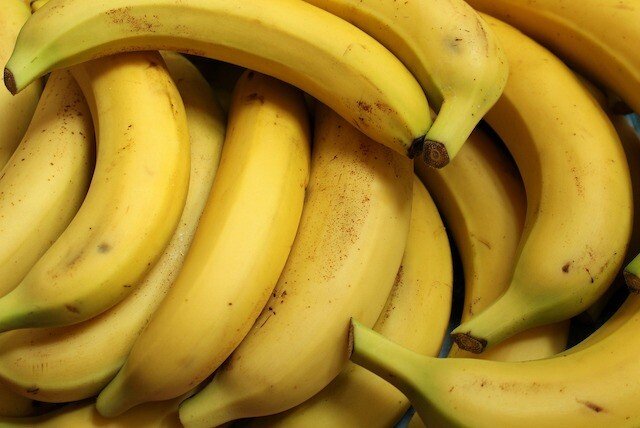
Photo: Pixabay
A patient in Langley recently emailed me asking if consuming bananas is healthy.
A “nutrition expert” told him that bananas were bad for him and that he should stop eating them. Patients consumed one banana a day in a green drink containing a variety of healthy green foods and protein powder. He had no known reactions to bananas and generally enjoyed eating them.
As with all foods we consume, there is always the possibility of allergies and food intolerances. The actual banana reaction rate is estimated to be less than 1% and may be related to latex sensitivity. Apart from that, bananas are considered to be a healthy fruit and a nutritious snack.
Bananas are the most popular fruit in the world. More than 100 billion bananas are consumed worldwide each year. Bananas are also produced in India, China, other Southeast Asian countries, parts of Africa, and Central and South America. The average North American consumes about 26 pounds per year.
Bananas are technically classified as a berry and an herb. There are over 50 groups and over 1,000 types of bananas. Plantains are considered cooking bananas, while the yellow Cavendish variety, which is most commonly consumed in supermarkets, is considered a dessert banana.
A bunch of bananas is called a “hand” and a single banana is called a “finger.” The average banana is 75% water. Bananas usually float on water due to their low density. One medium-sized banana contains about 11 milligrams of tryptophan, which is used to produce the mood-boosting hormone serotonin. Bananas also contain trace amounts of vitamin B6, vitamin C, manganese, melatonin, and other antioxidants and phytonutrients.
One medium-sized banana weighs about 100 grams. One banana contains 90 calories, 1.1 grams of protein, 0.3 grams of fat, and 23 grams of carbohydrates. It also contains 2.6 grams of fiber, 12 grams of sugar, and no cholesterol. It’s a myth held by some in the nutrition world that bananas are extremely rich in potassium. Contains an average amount of potassium compared to other fruits and vegetables. The average banana contains about 450 milligrams of potassium.
Other foods high in potassium include 840 milligrams in 1 cup of cooked spinach, 710 milligrams in 1 avocado, 610 milligrams in 1 potato with skin, 550 milligrams in 1 cup of plain yogurt, and 520 milligrams in 1 beet. , one beet contains 510 milligrams. 460 milligrams in 1 cup of cooked Brussels sprouts and 1 cup of cooked broccoli. A medium-sized banana also contains 27 milligrams of magnesium, 22 milligrams of phosphorus, 5 milligrams of calcium, 0.26 milligrams of iron, and 0.15 milligrams of zinc.
Some people claim that bananas are very high in sugar. Some people claim that bananas can make you fat. Neither is true. Up to 16% of a banana’s weight is made up of carbohydrates. One medium-sized banana contains about 23 grams of carbohydrates, primarily starches and simple sugars. Contains 12 grams of monosaccharides such as glucose, fructose, and sucrose. Bananas have a moderate glycemic index between 42 and 58, making them suitable for diabetics to consume in moderation. The sucrose content of unripe bananas was measured and was approximately 1 gram. Sugar content in ripe bananas increases to 2.5 grams, but drops back to about 1 gram when overripe. During the ripening process, some of the starch is converted to glucose, increasing the sugar content of this fruit. Also, each banana contains less than 100 calories and less than 1 gram of fat, so you won’t gain weight. Bananas are a healthy snack and are included in the main course in many tropical countries.
Bananas share about 50% of the same DNA as humans. Although many different species exist, the monoculture of the common yellow Cavendish banana limits its genetic diversity. This makes this banana species highly susceptible to fungal, bacterial, and viral infections. Gros Michel bananas were considered creamier and tastier than Cavendish bananas, but this species became extinct in the 19th century due to a fungal infection called Panama disease.
Bananas are a great addition to a healthy diet for most people. They lower blood pressure, reduce the risk of heart disease and stroke, improve insulin sensitivity in type 2 diabetics, aid in weight loss, satisfy sugar cravings, reduce heartburn and stomach problems, and It aids in proper bowel function and helps relieve constipation. , supports healthy gut flora and provides electrolytes and energy for recovery during exercise. Anecdotal reports suggest that the inner banana peel may treat skin warts.
This article was written by or on behalf of an outsourced columnist and does not necessarily reflect the views of Castanet.

